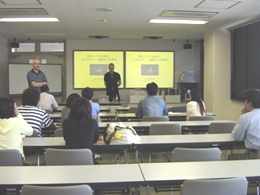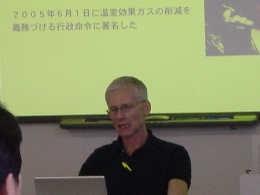リスク研究センター
セミナー 2007/6/1
Andrew Dewit氏(立教大学経済政策学科経済学研究科教授)
『孤立している日本:エネルギー、温暖化と外部性』
日時: 平成19年6月1日(金)14:30~16:30
会場: 経済学部第二校舎棟5階 545共同研究室
司会: ロバート・アスピノール教授 (本学経済学部)

|

|
(セミナー概要)
Professor DeWit began by talking about the ‘age of oil’ and how oil fueled the development of the industrial world in the Twentieth Century. He argued that the importance of oil lay in its positive externalities, i.e. its high energy density, its low cost of production etc. In spite of these benefits, a national reliance on oil in the case of Japan has also entailed serious negative externalities. Thus one of the motives for Japan’s attack on American bases and invasion of South East Asia in 1941 was the quest to secure alternative supplies of oil after supplies from the United States were cut off. Professor DeWit posed the provocative question: was the Pacific War (1941-45) the “first energy war”?
Postwar Japan soon became more dependent on oil than prewar Japan had been. When the first oil shock struck in 1973 Japan was dependent on oil for 77.4% of its primary energy. Furthermore most of this oil came from the Middle East. Conventional wisdom says that Japan learned a lesson form the oil shocks of the 1970s and diversified its energy supplies. However Professor DeWit shows that the availability of cheaper oil in the 1990s combined with an energy policy that played down the needs of energy security in favour of the need to get cheap energy to help Japan’s troubled economy, has lead to a return to over-dependency on oil.
Professor DeWit went on to argue that the Japanese government’s short-sighted policy on energy also has consequences for the nation’s policy on global warming. There is now no doubt among scientists that global warming is a reality. Professor Dewit argues that this should create opportunities for Japanese high-tech companies in providing new environmental technology for which there will surely be a huge demand. Prime Minister Abe, however, seems too intent on following American President George W. Bush who is moving very cautiously in response to the dangers of global warming. DeWit points out, however, that it is a mistake so see President Bush as the true face of America on environmental policy. He suggests that Japan would be better off following the example of Arnold Schwarzenegger, the Governor of California, who is boosting renewable energy sources in his state. California aims to have 20% of its energy supplied by renewable sources by the year 2017. In contrast Japan’s target for the year 2014 is the much more modest 1.63%. Professor DeWit urged Japanese policy-makers to urgently re-think both national energy policy, and policy with respect to global warming.(by Robert Aspinall)
デウィット教授は、まず「石油の時代」について、そして石油がいかに20世紀の産業発展のいわば燃料補給に貢献したかについて話し始められた。教授は、石油の重要性は、その正の外部性 すなわちエネルギーとしての密度の濃さ、生産の低価格性などにあるとする。これらの利点に反し、国としての日本の石油依存は、深刻な負の外部性をもひきずってきた。例えば、1941年の日本のアメリカ真珠湾攻撃と東南アジア侵略であるが、その目的のひとつはアメリカから供給を断たれた石油の代替供給の確保を求めてのことであった。デウィット教授は、我々に次のような挑発的な疑問を投げかけた:「太平洋戦争(1941~45)は最初のエネルギー戦争ではなかったのか?」
戦後、日本はかつての石油依存にも増してますます石油に依存するようになっていた。1973年に、最初のオイルショックが日本を襲ったとき、第1次エネルギーとしての石油への依存度は77.4%であった。さらにこの石油のほとんどが中東から輸入されていた。世間では、日本は、この1970年代のオイルショックから学び、そのエネルギー源の多様化をはかったのだと言う。しかしながらデウィット教授は、不調な日本経済救済のために安価なエネルギーを手に入れる必要性のほうを選んで、エネルギーの安全保障を軽視したエネルギー政策と結びつけた1990年代のより安価な石油の利用が、再び石油への過剰依存へとつながっていったのだと説明する。
デウィット教授の主張は、さらに、日本政府の先見性のないエネルギー政策は、国の温暖化対策にも影響を与えていると続いた。今や地球温暖化が現実のものであることは科学者間では疑いのないところである。デウィット教授は、これは、日本のハイテク企業にとって、必ずや大きな需要を産むであろう新らしい環境工学を提供するまたとない機会を創り出すものだと言う。しかし、安倍総理は、地球温暖化の危険性には慎重に対処しているアメリカのブッシュ大統領に追随するのに専念しすぎているようだ。だが、とデウィット教授は指摘する。環境政策に関して、ブッシュ大統領をアメリカの真実の顔とみることは間違いであると。日本は、カリフォルニア州知事アーノルド・シュワルツネッガーが自州で打ち上げた再生可能エネルギー資源の開発の例に従うのが賢明であると、彼は提案する。カリフォルニアは、2017年までに再生可能エネルギーによる供給率を20%にしようと計画している。これに対し、日本の目標は2014年までに1.63%というはるかに控えめな目標だ。デウィット教授は、日本の政策立案者は、国のエネルギー政策及び温暖化に関する政策の双方について緊急に考え直すべきだと強く主張された。
主催:滋賀大学経済学部附属リスク研究センター
TEL:0749-27-1404(内線396) FAX:0749-27-1189
e-mail address:risk@biwako.shiga-u.ac.jp
リスク研究センターホームページへ


